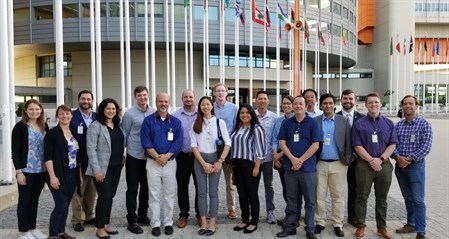
From June 15-22, the Texas A&M Engineering Experiment Station’s Center for Nuclear Security Science and Policy Initiatives coordinated with Argonne National Laboratory to provide an International Nuclear Facilities Experience (INFE) that allowed graduate-level engineering and policy students, and early career professionals from laboratories in the U.S. to visit nuclear facilities in foreign countries. This year the INFE visited several nuclear fuel cycle facilities and laboratories in the Netherlands, Germany and Austria.
The INFE provides participants with a better understanding of facility operations, nuclear materials management and applied material safeguards than they would have through their academic coursework. As part of the experience, they get to the opportunity to visit a series of facilities where practitioners and facility operators give presentations and discuss the practical application of safeguards and security measures. Participants also have the opportunity to witness first-hand how nuclear safeguards work at various types of facilities, some of which are not found within the United States.
“The program gave the rare opportunity to catch a glimpse of the real-world applications of nuclear safeguards,” said Miles Chen, a graduate student at Texas A&M University who participated in the INFE. “The facility personnel were very kind in having provided insightful presentations and tours.”
Chen also noted that a highlight of the experience was meeting fellow travelers and learning about their experience and expertise. The INFE provides excellent networking opportunities for participants to strengthen relationships among fellow students, staff, faculty and professionals while traveling and experiencing a foreign country.
The participants for this year’s INFE included ten graduate students from Texas A&M, Middlebury Institute of International Studies at Monterey, Oregon State University, University of Maryland, University of Tennessee-Knoxville, The University of Texas at Austin and Virginia Commonwealth University, and five early career professionals from Idaho, Lawrence Livermore, Pacific Northwest and Savannah River National Laboratories. Dr. Claudio Gariazzo of Argonne National Laboratory led the INFE with help from NSSPI faculty members Dr. Shaheen Dewji and Dr. Craig Marianno.
Jay Joshi, a graduate student at The University of Texas at Austin, described how experiences like the INFE can also give participants perspective on the work they are doing in the field of nuclear nonproliferation and safeguards, as well as renewed purpose.
“What I saw and experienced during the trip was all about the enhancement of well-being across the world,” said Joshi. “Whether it was use of peaceful nuclear energy, nuclear safeguards, cancer treatment or poverty elimination via irradiation, they were all about a better future for mankind. The trip strengthened the purpose of my research. It made me realize that the work that I am doing is not just for me, but it has a much wider scope. Now I’m more inspired to learn more and do more in this field.”
In the Netherlands the INFE group toured Urenco Nederland in Almelo, where they saw safeguards applied to a uranium enrichment facility. They then visited the Framatome Advanced Nuclear Fuels facility in Lingen, Germany, which manufactures fuel assemblies, provides powder and pellets to other fuel fabrication plants, and disassembles and recycles unused fuel assemblies from decommissioned facilities in the country. From there they traveled to the European Commission’s Joint Research Center in Karlsruhe, Germany, to see their laboratories and the European Nuclear Security Training Center there. Finally, they went to Vienna, Austria, to visit the International Atomic Energy Agency (IAEA) headquarters and the IAEA laboratories in Seibersdorf.
“The knowledge and insights gained by first-hand observations of nuclear science and applications at laboratories and facilities gave context to the concepts I’ve been learning in graduate school,” said Laura Micewski, a graduate student participant from Oregon State University. “Individuals in the cohort also benefited from the diversity of experience and expertise internal to the group, which included both technical and policy experts, at various stages in their education or career. The INFE has the potential to be a life-changing experience for many participants because it made us aware of possibilities for future research and employment in the very important field of international safeguards.”
The National Nuclear Security Administration’s Office of International Nuclear Safeguards provides financial support for both the INFE and the Domestic Nuclear Facilities Experience.
